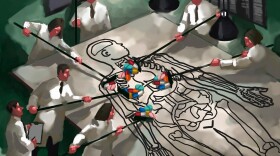-
Max Baker got treatment for his opioid dependency and kicked the habit. He'd been clean for more than a year when a car accident and subsequent surgery returned him to addiction's spiral.
-
Scientists at Cincinnati Children's Hospital and Ben Gurion University have developed a prototype device designed to quickly and accurately locate a...
-
Cancer patients increasingly delay or skip taking medication because they can't afford it. New drugs that can cost $100,000 or more a year mean more people suffering "financial toxicity."
-
Synthetic blood is the Holy Grail for doctors. And though a true version has so far escaped scientsts, researchers at Ohio State University think they may…
-
Leaders at Ohio State’s Wexner Medical Center says they’re trying to make it easier for doctors and nurses to comply with a law meant to curb doctor…
-
Several new studies document widespread conflicts of interest in medicine. The way we think about disease "is being subtly distorted" by financial ties, the authors of an accompanying editorial write.
-
Treating people through nutrition is not a new idea, but it's making inroads as more medical professionals make meals a formal part of care, rather than relying solely on medications.
-
Most people's doctors put their health information in an electronic health record. Scientists are mining those records for clues to what treatments work best for individuals.
-
If male doctors were as good as their female counterparts at caring for older people in the hospital, about 32,000 fewer patients a year would die. What do female doctors do better than men?
-
In a year when venting spleen dominated much of public discourse, we consider the humble organ of that name. You can live without your spleen, but your immune system will be happier with it.
© 2025 WOSU Public Media
Play Live Radio
Next Up:
0:00
0:00
Available On Air Stations










